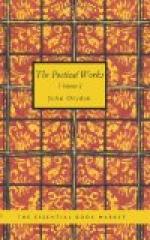Are left at last in martyrdom to die;
Such is the end of oft-repeated miracles.
Forgive me, Heaven, that impious thought!
’Twas grief for Charles, to madness wrought,
That question’d thy supreme decree.
Thou didst his gracious reign prolong,
Even in thy saints’ and angels’ wrong,
His fellow-citizens of immortality:
For twelve long years of exile borne,
Twice twelve we number’d since his blest return:
So strictly wert thou just to pay,
Even to the driblet of a day.
Yet still we murmur and complain,
The quails and manna should no longer rain;
Those miracles ’twas needless to renew;
The chosen stock has now the promised land in view.
XV.
A warlike prince ascends
the regal state,
A prince long exercised by fate:
Long may he keep, though he obtains it
late!
Heroes in Heaven’s peculiar mould
are cast,
They and their poets are not form’d
in haste;
Man was the first in God’s design,
and man was made the last.
False heroes, made by flattery so,
Heaven can strike out, like sparkles,
at a blow;
But ere a prince is to perfection brought,
He costs Omnipotence a second thought.
With toil and sweat,
With hardening cold, and forming heat,
The Cyclops did their strokes repeat,
Before the impenetrable shield was wrought.
It looks as if the Maker would not own
The noble work for His,
Before ’twas tried and found a masterpiece.
XVI.
View, then, a monarch ripen’d for
a throne!
Alcides thus his race began,
O’er infancy he swiftly ran;
The future god at first was more than
man:
Dangers and toils, and Juno’s hate,
Even o’er his cradle lay in wait;
And there he grappled first with fate:
In his young hands the hissing snakes
he press’d,
So early was the deity confess’d.
Thus by degrees he rose to Jove’s
imperial seat;
Thus difficulties prove a soul legitimately
great.
Like his, our hero’s infancy was
tried;
Betimes the Furies did their snakes provide;
And to his infant arms oppose
His father’s rebels, and his brother’s
foes;
The more oppress’d, the higher still
he rose:
Those were the preludes of his fate,
That form’d his manhood, to subdue
The Hydra of the many-headed hissing crew.
XVII.
As after Numa’s
peaceful reign,
The martial Ancus did the sceptre wield,
Furbish’d the rusty sword again,
Resumed the long-forgotten shield,
And led the Latins to the dusty field;
So James the drowsy genius wakes
Of Britain, long entranced in charms,
Restive and slumbering on its arms:
’Tis roused, and with a new-strung
nerve, the spear already shakes,
No neighing of the warrior steeds,




